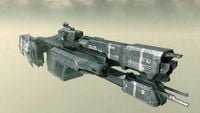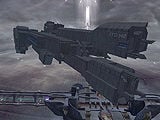UNSC frigate
From Halopedia, the Halo wiki
Template:Ratings Template:Ship
The UNSC Frigate is a starship classification in the UNSC Navy. Although it significantly lacks the amount of armor, armament, and firepower compared to its larger cousin, the UNSC Destroyer, the Frigate is smaller and thus more maneuverable. It is cheaper to produce, allowing greater numbers to be fielded against the Covenant.
Background
With current human technology, the UNSC Frigate are barely a match for even the smallest of Covenant starships. It is outrun even by smaller Covenant ships, its armor is susceptible to enemy pulse lasers and plasma torpedoes, and it is outfitted with substandard weaponry. Only en masse does the UNSC Frigate give any United Nations Space Command fleet element an advantage in the war against the genocidal Covenant. Needless to say, even a Covenant Frigate is more than a match for its UNSC counterpart.
Layout
The bridge of the Frigate is located in the uppermost part of the ship, in the section at the stern-most tip of the MAC gun shaft (in the case of the only seen version of the UNSC frigate, there is another layout variation similar in appearance to the UNSC Halcyon-class Cruiser, Pillar of Autumn). The Commanding Officer's chair is located behind the two primary consoles within the bridge. There are numerous other consoles located at the sides of the room. There are four bridge stations: Navigation, Operations, Weapons, and Communications.
UNSC Frigates also possess at least one HEV Bay which facilitates the deployment of Orbital Drop Shock Troopers.
UNSC Frigates (specifically the Forward Unto Dawn, In Amber Clad and Aegis Fate) are capable of hovering in an atmosphere and possibly landing. They also have either a garage or cargo bay in their rear section which is capable of extending out of the ship's ventral side to deploy vehicles or cargo directly to the ground. [1] Frigates are seen carrying 3 Pelican Dropships in the rear section. It is unknown how many Longsword Fighters are carried although Frigates have bay doors in the structure between the MAC Gun strut and the bottom one. In Amber Clad had 6 doors on each side but all the frigates in Halo 3 are seen with 5 doors on each side. It is possible that these are Longsword bays, that means Frigates are capable of carrying 10-12 Longswords each, although at the same time they seem small to fit the large craft in, which would make these doors possible Pelican bays, since pelicans are ot ever seen in the hangar of a frigate.
Specifications
Dimensions
A typical Frigate appears to be around 478 meters (1568 ft) long, 151 meters (498 ft) wide and 112 meters (396 ft) tall. It is one of the smallest warships fielded by the UNSC.
Propulsion
Like other Human ships, the UNSC Frigate is equipped with two nuclear reactors which initiate the process of fusion of deuterium fuel. The reactors then channel the output into exhausts at the vessel's rear. There are four exhausts visible on the craft; two large ones and two small ones. For translight speeds, the Frigate carries a Shaw-Fujikawa Slipspace drive. There are probably multiple maneuvering thrusters to adjust the vessel's attitude in pitch, roll and yaw. Lastly, Frigates are equipped with vertical engines which allow it to hover in an atmosphere; an advantage of its small size and mass.
Armament
A typical UNSC Frigate carriers the following armament:
- 1 MAC Cannon which would require one charge per shot and store around 50 rounds. Due to a MAC gun's size, it is very likely for it to take up most, if not all, of the Frigate's length. (Please Note: 50 shells weighing 600 tonnes each means that 7/8 of the loaded weight of a frigate is MAC ammunition?)
- 3 Shiva Nuclear Missiles which would function as the ship's heavy nuclear ordnance, and used only at long range, as the EMP produced by one could cause major damage to a UNSC ships' computer functions.
- 30 Archer Missile Pods which would carry around thirty missiles per pod, adding up to a total of 900 missiles.
- 50mm point defense guns which would function as the last line of defense against incoming missiles or single ships.
- 4 Defensive Railgun Turrets for close in defence against warships and aircraft [2].
Crew
No precise figures are available regarding the crew of a Frigate, but it is likely relatively small, (maybe a few hundred would be stationed in a Frigate). Like larger ships, a detachment of Marines and sometimes ODSTs would be present onboard. The crew number includes deck crews as well as the command crew, Marines, ODST's, Longsword and Pelican Pilots and technical personnel. The number of personnel a single frigate is capable of housing numbers at least in the thousands.[3]
In 2552 Sergeant Avery Johnson was supposedly able to single-handedly control the frigate Forward Unto Dawn to help out John-117 and Arbiter Thel Vadam on the newly rebuilt Halo, though this may have been a kind of auto-pilot function.
Superstructure
The armor of a Frigate is relatively poor compared to that of its larger cousins and counterparts such as the UNSC Destroyer with just 60cm of battle plate. However, due to it being relatively lightweight, the Frigate's strength lies instead in maneuverability and speed. In addition, over the decades that the war has gone on, Frigates needed refits and they could have been given more armor overtime. The Forward Unto Dawn and the In Amber Clad look very different from many angles but are still classified as Frigates.
The Frigate's relatively wide design is supported by structural support ribs, allowing it to preform orbital incursions [4].
Known Frigates
Gallery
UNSC Aegis Fate over Sandtrap (FFG-307).
UNSC In Amber Clad in High Charity (FFG-142).
- New frigate.jpg
UNSC Forward Unto Dawn (FFG-201).
Frigate firing a round from its Magnetic Accelerator Cannon.
- 10203554-Full.jpg
The Archer Pods of the Foward Unto Dawn.
- InAmberClad-scale.gif
Frigate Scale.
- Navesota.jpg
UNSC Aegis Fate (FFG-307)



